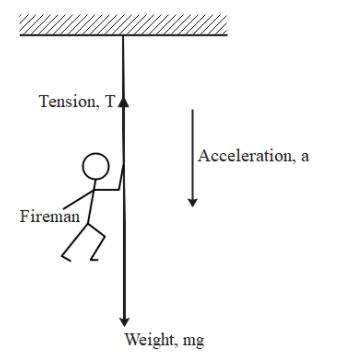Question
Question: With what minimum acceleration can a fireman slide down a rope while breaking strength of the rope i...
With what minimum acceleration can a fireman slide down a rope while breaking strength of the rope is 32 of the weight?
(A). 32g
(B). g
(B). 31g
(D). Zero
Solution
These types of questions can be easily solved using Newtonian physics. Firstly understand the problem thoroughly, and then draw a simple diagram dissipating the same for better understanding. Lastly apply Newton’s law of motion to find the required answer.
Formula Used :
ma=mg−T
where T is the tension in the string,
a is the downwards acceleration,
g is the acceleration due to gravity,
and m is the mass of the fireman.
Complete step-by-step answer :
Given: There is a rope whose breaking strength is 32 the weight of a fireman. And we are asked to calculate the minimum acceleration with which the fireman can slide down this rope.
The following diagram dissipates the given problem perfectly:

Let the weight of the fireman be mg and his downward acceleration be a.
Breaking strength of rope, T=32mg (given)
Using Newton’s second law of motion which states that the acceleration of a particle as measured from an inertial frames given by the vector sum of all the forces acting on the particle divided by its mass, we have:
\eqalign{
& ma = mg - T \cr
& \Rightarrow ma = mg - \dfrac{2}{3}mg \cr
& \Rightarrow ma = \dfrac{1}{3}mg \cr
& \Rightarrow a = \dfrac{g}{3} \cr}
Therefore, the minimum acceleration by which a fireman can slide down a rope while breaking strength of the rope is 32 of the weight is 31g.
So, the correct answer for the given question is C. i.e., 31g.
Note :
Students often get the answer wrong for these types of questions because they fail to draw a proper diagram and then apply Newton's law. It is very crucial to draw the diagram; otherwise students can make errors in assuming the direction vectors of the forces resulting in wrong and meaningless equations. Which in turn would obviously result in wrong answers.
